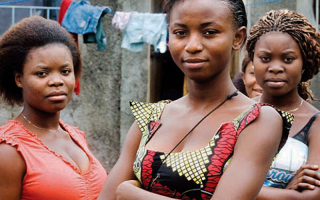Dominate virtually China - Africa Human Resources businesses
Make money at China – Africa or EU – Africa Human Resources.
Are you expert in HR, training Industry, or ethics?
Or in China – Africa or European Union – Africa bilateral trade?
Contact us here info@sylodium.com to make money together.
But please, reasonable (not tipical) HR towards beneficial circuit business, not paternalism, not charity.
In Sylodium you can choose niches as Shanghai – West Africa HR projects, Spain – Nigeria HR 4.0, Hong Kong – South Africa HR APPS, Italy – East Africa HR games, Paris - North Africa immigration solutions, etc to dominate them virtually.
Your ideas mean money in Sylodium. Towards a reasonable games Industry.
Are you in Human Resources Industry from China or EU to Africa?
Our logical business system, allows you to segment your target markets to be seen, and dominate the bilateral trade niches you choose
Sylodium is the unique platform that represent the reality (reproducing your business) of international trade in Internet.
Africa and Europe: the thorny question of migration
New from Aljaazera.com
According to the African Development Bank, young people under the age of 15 make up 40 percent of African population and another 20 percent is aged between 15 and 24.
This could be both an opportunity and a threat: it could spur production and consumption and create a virtuous circle of growth and prosperity; or it could be a source of an unmanageable "youth bulge" resulting in social unrest, exclusion, "illegal" migration and anti-social behavior. It all depends on what Africa will do with its large youth population.

The Abidjan European Union/African Union Summit November 29-30, 2017, rightly focused on the theme of Investing in Youth for a Sustainable Future. Europe is concerned with curbing the rising flow of undocumented migrants through its southern borders in Italy, Greece and Spain; on the other hand, African countries are keen on reaching the right human development level, an effective regional integration, and a working partnership with European countries to achieve sustained growth as a means to tackle poverty, displacement and unemployment, especially among youth.
European countries think that African countries are poorly governed and thereby can ensure neither sustained growth nor effective border control to deal with roots and causes of migration. African countries, on the other hand, see in Europe a group of "proto-colonial" powers keen on ensuring a seamless flow of imported raw materials and a select well-educated human capital from African countries, at the same time expecting African countries to play the role of "gendarme", monitoring their borders against illegal passage of migrants and traffickers to Europe.
Europe should see in Africa not only a combined source of raw wealth and migration ills, but a real partner in investments, public-private ventures, free movement of both capital and qualified human resources and an ally in the fight against terrorism and organised crime.

The 5th AU-EU summit's focus on investing in youth, is a way of responding to both African and European concerns. By achieving an economic transformation of Africa (especially through investment in agriculture, agro-business, industry, renewable energy and the digital sector as stated in the summit's final declaration), jobs will be created, livelihoods improved and less youth will be lured by the mirage of the European Eldorado on the northern side of the Mediterranean. European countries have pledged $40bn by 2020 to invest in priority projects that will help achieve this grand objective.
Europe needs to rethink its 'forteress' mentality and ensure a reasonable flow of legal migrants through improved and intelligent visa procedures. Migration could be beneficial to both an ageing Europe and a rapidly developing Africa. On the other hand, investing in Africa is not only a matter of funding but it is question of transfer of skills and a laborious empowerment of public and private sector institutions to design, execute and monitor development projects that require complex engineering and financial skills. It is easy to reap quick profit in Africa nowadays, but it is not sustainble. Investing in empowerment of Africa is investing in the future of both Africa and Europe.

After WWII, the US designed a bold idea to rebuild a war-devastated Europe. It was called the Marshall Plan. It helped set up the base for two decades of growth, development and prosperity and spurred an unprecedented and durable transformation of West European economies. It is that kind of bold idea that Africa needs nowadays from both Europe and African regional powers like South Africa, Nigeria, Morocco, Algeria and Egypt. A grand plan for Africa should consist of building infrastructure, improving maritime and road connectivity, setting up gas and oil pipelines, constructing ports and logistics networks, designing industrial clusters, building regional universities and research centers, investing in mega solar, hydraulic and wind energy stations with the right regional connectivity, and improving farm yields and local produce treatment and transformation.
Funding should not be a problem as China, Japan, Russia, the Gulf countries in addition to Europe and African countries themselves will see in investing in the transformation of Africa a great opportunity to be there when the much-awaited prosperity of this promising continent will answer the call. Only bold thinking will help turn the tide; and Africa is worth it, for the sake of Africans, and the whole World.

